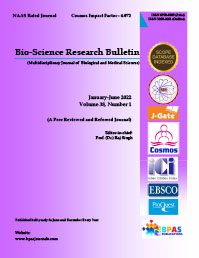Remarks on the Vulnerable World Hypothesis Nick Bostrom
DOI:
https://doi.org/10.48165/Keywords:
Vulnerable World Hypothesis, Nick Bostrom, Inventions, World’s FutureAbstract
In the past few decades, there is trend of increasing number of new inventions and technologies being introduced to the world. While conventionally, all new technologies are considered as an indicator of human progress, but as Nick Bostrom argues, actually we may think of new inventions as picking balls from an urn. We can find: white balls (good inventions to benefit of mankind), grey balls (inventions which bring some good but also some harms to mankind), and black balls (inventions which may bring the world population into extinction). In this short review, while we agree with Bostrom’s arguments, we don’t agree on his recipe to create a global surveillance. We discuss a few examples other than what Bostrom points out.
References
Nick Bostrom. (2019). The Vulnerable World Hypothesis. Global Policy 10(4).
John Lennox (2020). 2084: Artificial Intelligence and the future of humanity. Zondervan.
D. King (1996). Is human mind a Turing machine? Synthese, vol. 108, no. 3. url: https://www.jstor.org/stable/20117549
Stuart Kaufmann (2010). Is the human mind algorithmic? NPR. Url: https://www.npr.org/sections/13.7/2010/ 03/is_the_human_mind_algorithmic_1.html 5. Jim Slagle. The Epistemological Skyhook:
Determinism, Naturalism, and Self-Defeat. http://books.google.co.id
Ronald N. Kostoff et al (2020). Adverse health effects of 5G mobile networking technology under real-life conditions. Toxicol Lett. 323, 35-40. doi: 10.1016/j.toxlet.2020.01.020. Epub 2020 Jan 25.
Paolo Crippa (2020). 5G and Coronavirus: How Disinformation Can Put Critical Infrastructures At Risk. Url:https://cesi italia.org/contents/Analisi/CeSI_5G_coron avirus_disinformation_threat.pdf
